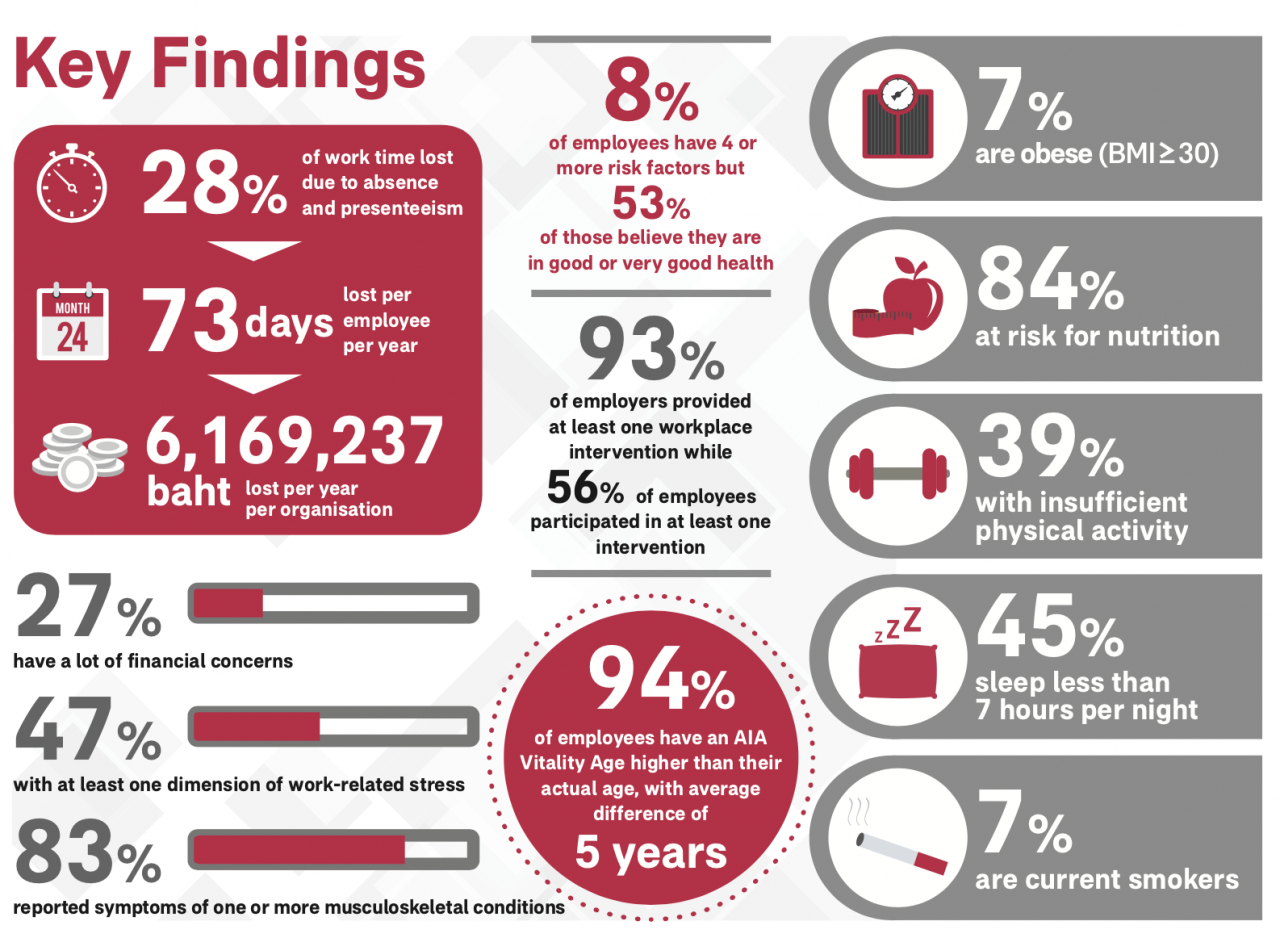Companies in Thailand lose 73 days of productivity per employee each year due to health issues, study says
Organisations in Thailand are losing an average of 73 days of productive time per employee each year due to health-related absenteeism and employees who still work while ill, a survey by AIA Thailand has found.
The insurance company said in press release issued on Thursday that the lost time in Thailand compared to 49 days in Australia and 74 days in the Asian countries. The average yearly cost per organisation is estimated at Bt6,169,237.
The study also showed that poor lifestyle choices and mental health are issues for employees in Thailand, which can lower workplace productivity and increase the risk of developing a chronic condition.
The study showed that 39 per cent of employees in Thailand surveyed do less than 150 minutes of physical activity per week, and 45 per cent sleep less than seven hours, compared to around 10 per cent and 27 per cent in Australia respectively.
While just 1.2 per cent of employees in Thailand exceed recommended consumption limits of 14 units of alcohol per week (1 unit = 275-330 ml of beer or 100 ml. glass of wine) and almost 7 per cent are current smokers and more than 84 per cent of employees do not eat a balanced diet, the study said.
The study involved 146 organisations, representing a combined workforce of 7,539 employees across Thailand, the company said.
As for mental health, the survey found that almost half of employees interviewed are suffering from at least one facet of work-related stress, 5 per cent of employees have high levels of anxiety or depressive symptoms, and 27 per cent of employees noted they had a lot of financial concerns.
Meanwhile, Thailand reported a lower percentage of employees than Australia and the Asian countries at risk in the area of clinical health. Just 7.3 per cent of interviewed employees are obese (BMI equal to or higher than 30), which is lower than 17.4 per cent in the Asian countries and 17.6 per cent in Australia.
The study showed 83 per cent of employees in Thailand reported symptoms of one or more musculoskeletal conditions compared to 84 per cent in the Asian countries, among which shoulder and neck pain are the most common symptoms. In addition, 24 per cent of participating employees in Thailand reported one or more chronic conditions, compared to 30 per cent and 37 per cent in the Asian countries and Australia respectively. These chronic diseases include high blood pressure, diabetes, heart disease, and cancer.
Despite the findings, the company said the research demonstrates that Thailand’s employers are aware of the importance of workplace health interventions. A total of 93 per cent of employers have offered at least one health and well-being program or facility in the workplace, while 56 per cent of employees participated in at least one workplace intervention and indicated that the interventions positively impacted their health.
Tan Hak Leh, Chief Executive Officer of AIA Thailand, said: “We are glad to see a high participation rate in the ‘Thailand’s Healthiest Workplace by AIA Vitality’ survey this year, as this indicates that Thailand’s organisations see the value of improving their employees’ health and wellbeing.
“The survey, which reveals some concerns on the part of employees in Thailand about unhealthy lifestyle choices and mental health, resulting in a high productivity loss in organisations, demonstrates that employers should take proactive measures to improve or initiate their health promotion strategies and plans in order to create a healthier and more productive environment for their staff, which will ultimately enhance their organisations’ productivity.”
Aekkaratt Thitimon, Chief Marketing Officer of AIA Thailand, said: “The health and well-being of employees is very important in contributing to business success. To help employers develop a healthy and energetic workforce, AIA continuously initiates various health programs and activities for our corporate customers. We have also introduced an industry-first corporate wellness program called AIA Vitality for organisations. It offers fabulous incentives to encourage employees to adopt healthier lifestyles and achieve sustainable behavioural changes to enhance their productivity and deliver on our brand promise of helping Thais live healthier, longer, and better lives.”
The study was developed by AIA Group and delivered in partnership with RAND Europe since 2017. The survey examines data on employee lifestyles, clinical indicators, mental health, stress, and other areas of concern, with the objective of assessing the associated impact on health and productivity.
In 2018, the wider Healthiest Workplace survey, encompassing Australia, Hong Kong, Malaysia, and Thailand, involved the participation of 340 organisations representing a combined workforce of 24,187 employees. Thailand’s results are benchmarked against Hong Kong and Malaysia, (combined in ‘the Asian countries’ benchmark) and Australia.
The Healthiest Workplace by AIA Vitality also recognises excellence in workplace wellness across three award categories; Healthiest Workplace, Healthiest Employer and Healthiest Employees and three organisation sizes; Small (20-249 employees), Medium (250-999 employees), and Large (1,000+ employees). The winners of the first-ever Thailand’s Healthiest Workplace by AIA Vitality awards are:
Healthiest Workplace
• Small organisation – Public Health Center 16 Lumpini
• Medium organisation – WE Fitness Co., Ltd
• Large organisation – Phyathai Sriracha Hospital
Healthiest Employer
• Small organisation – PTT Polymer Marketing Company Limited
• Medium organisation – Grand Hyatt Erawan Bangkok
• Large organisation – Advanced Info Service Plc.
Healthiest Employees
• Small organisation – Public Health Center 16 Lumpini
• Medium organisation – WE Fitness Co., Ltd
• Large organisation – Phyathai Sriracha Hospital
Source: http://www.nationmultimedia.com/detail/Corporate/30360312


 English
English




